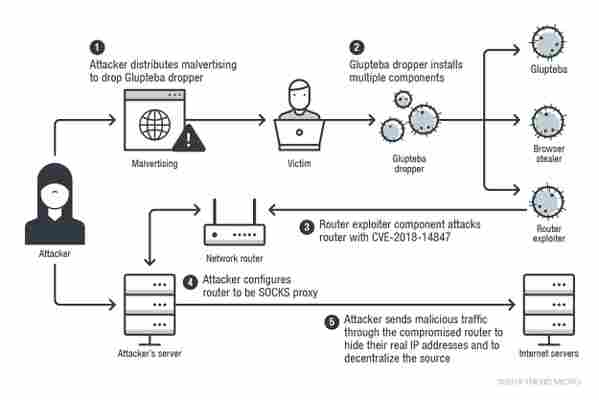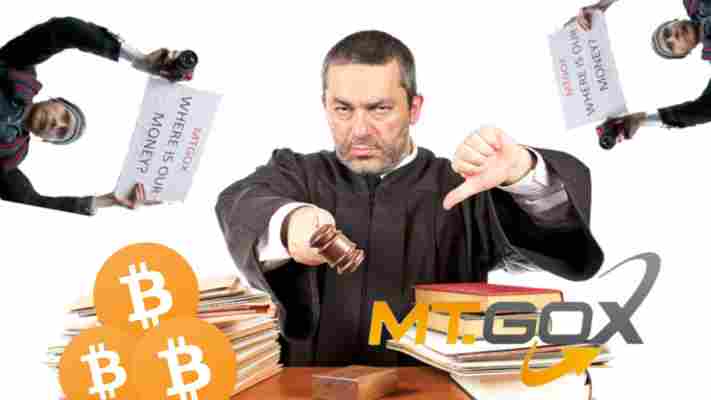Cybersecurity researchers have discovered a new strain of the nefarious Glupteba malware that uses the Bitcoin blockchain to ensure it remains dangerous.

TrendMicro’s latest blog details the previously undocumented variant which is capable of invading systems to mine Monero cryptocurrency and steal sensitive browser data like passwords and cookies.
Analysts confirmed this version of Glupteba also exploits an already-discovered security vulnerability in MicroTik routers to transform the target machine into a SOCKS proxy to initiate widespread spam attacks that could threaten Instagram users.
Attackers transfer Bitcoin with Electrum to keep Glupteba online
Infection typically works like this: a target machine is first hit with a “ malvertising attack,” which forces it to download a Glupteba “dropper.”
The dropper will flood the target with various rootkits, backdoors, and other nasties taken from GitHub . It then does the usual stuff like check for antivirus programs, add malicious firewall rules, as well as include itself in defender whitelists.
Most notable, however, is that this malware utilizes Bitcoin to automatically update, ensuring it runs smoothly even if antivirus software blocks its connection to remote command and control (C&C) servers run by the attackers.


According to TrendMicro researchers, Glupteba goons will first send Bitcoin transactions via the Electrum Bitcoin wallet, which Hard Fork previously reported had been threatened by a prolific phishing campaign.
The malware, which has been programmed with a hardcoded ScriptHash string, will then make its way through a public list of Electrum servers to find every transaction that was made by the attacker.
Buried in those transactions is seemingly innocent OP_RETURN data which contains an encrypted C&C domain. The ScriptHash string is then used to decrypt that data.
“This technique makes it more convenient for the threat actor to replace C&C servers,” said TrendMicro. “If they lose control of a C&C server for any reason, they simply need to add a new Bitcoin script and the infected machines obtain a new C&C server by decrypting the script data and reconnecting.”
To ensure your machine is protected against innovative threats like Glupteba , DON’T CLICK ON SUSPICIOUS LINKS AND EMAILS. Also, ensure your router’s firmware is up-to-date. Be safe out there.
Mark Karpelès faces US class action lawsuit over Mt Gox’s demise
Mark Karpelès, the ex-CEO of defunct cryptocurrency exchange Mt. Gox , will have to face a class-action lawsuit in Philadelphia about the notorious company ‘s demise five years ago.

It comes after District Judge Robert Kelly threw out Karpelès’ request to dismiss the suit, which alleges he hid problems at the exchange from its users , Reuters reports .
The case was brought forward by Gregory Pearce, a former Mt. Gox customer, who is representing himself as well as other victims affected by the exchange ‘s failure .
According to documents submitted in court , Pearce claims Karpelès was aware of “ security bugs in the system but did not make these defects known to the public.”
Karpelès has been involved in several lawsuits over the years. In fact, back in March, he said he would appeal a court ruling, which found him guilty of manipulating the financial records of his embattled cryptocurrency exchange to conceal its massive losses .
By 2013 and into 2014, Mt. Gox was reportedly handling more than 70 percent of all Bitcoin transactions worldwide. When the company collapsed in early 2014, it said it lost almost 750,000 of its customers ‘ Bitcoins , as well as around 100,000 of its own coins , a total sum of approximately $473 million near the time of the filing.
US academics say their shardy blockchain will be 10X faster than Visa
US academics are working together to create a new and improved cryptocurrency in a bid to rival Bitcoin.

According to Bloomberg , professors from seven US colleges (including MIT, University of California, Standford University, and Berkely) are looking to create a digital currency capable of processing thousands of transactions a second without sacrificing the basic principle of decentralization.
The project is run by Distributed Technology Research (DTR) , a non-profit organization established by academics with support from Pantera Capital Management LP to develop decentralized technologies.
Unit-e, the digital currency currently in the works, is the DTR’s first initiative.
Bitcoin’s problems
As cryptocurrencies and blockchain technology seek to break into the mainstream consciousness, there’s justifiable concern about the tech’s capability to keep up with demand.
Digital currencies such as Bitcoin and Ethereum use blocks to process transactions. In this instance, a transaction is essentially a transfer of value between wallets, which is recorded on the blockchain.
In the early days, the maximum size of these blocks was limited, in Bitcoin’s case, to just 1MB. This mechanism was put in place to make Bitcoin more secure but has failed to make the network future-proof. Let me put it this way: each transaction incurs more data and with the maximum block size sitting at 1MB, there’s a limit to how many payments the network is able to process simultaneously.
Bitcoin is able to handle around three to four transactions per second, whereas Ethereum can handle slightly more (a maximum of 15 transactions per second), but both fall short of the volume required to meet the ever-growing demand.
Scalability is an issue that needs to be addressed, and although some forks have taken place, no real consensus over the block size limit and its potential effects on decentralization has been reached as of yet.
Failing to address the issue could have far-reaching consequences for the industry. Transactions will likely take longer and longer to complete and a potential decrease in adoption could incur major losses across cryptocurrency markets.
Despite the emergence of many altcoins over the years, Bitcoin is credited with being the first digital currency and trustless peer-to-peer payment network. It’s built up somewhat of a cult following among anarchists, developers, and speculators but has failed to gain mainstream adoption.
Joey Krug, co-chief investment officer at Pantera Capital in San Francisco and a member of the DTR council, told Bloomberg:
Conscious that they’re up against a complex issue, the academics working on Unit-e are leveraging new instruments for reaching consensus.
They are relying on sharding – a process used to ensure that each node will only hold a part of the data on the blockchain, and not the entire set of information – and new payment channel networks to increase speed.
Pramod Viswanath, a professor of electrical and computer engineering at the University of Illinois Urbana-Champaign working on the project, said:
Unit-e is expected to launch in the second half of this year and its proponents hope it will be able to process as many as 10,000 transactions per second, which far surpasses Visa’s capability to process around 1,700.











